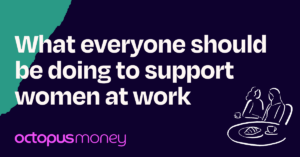Born and bred Londoner, Priya, a part time optometrist/violinist/investor, gives us the lowdown on how her own passion for personal finances and being self-employed led her to become a financial coach.
Priya, if you could switch lives with anybody for a day, who would it be?
I think it has to be Richard Branson. He’s up in space!
And if you could have any superpower, what would you choose?
I wish I had the power to help people empathise with others…to put someone in another person’s shoes. It’s so easy to say things without realising the impact they have on others. Maybe there would be a little more compassion in the world.
What an amazing superpower! Tell us a bit about yourself.
I’m one of those people who believes it’s really important to enjoy your work. So I try to do things which I find interesting and I’m genuinely passionate about. I feel really lucky to be in that position.
I work as an optician in community practices and I also have a property portfolio – plus the financial coaching, of course. I love my job.
I have many, many interests. Like music! I used to play the saxophone, but then I realised I missed classical music so I went back to the violin. I was getting really into it through lockdown.
Speaking of lockdown … what was the best thing to come out of the last year for you?
There’s been so many things actually. I cut down my work in optometry, because of the close contact, and I used that time to learn some new skills. For instance, I learnt how to invest in the stock market, because I actually had the time. I’d always sort of written that off, but it was amazing to have the chance to empower myself and learn something new. Financial coaching came after that, so you could say one led to the other!

Wow. A person of many talents! Did you always have such a joyful relationship to what you do?
No, not at all. I became an optometrist because I knew that’s what my family wanted, but I didn’t really enjoy it for the first ten years of my career. At some point, I started to mould it more around what I wanted. I became self-employed and that was really the first step to becoming my own boss. It’s given me my freedom.
Is that one of the reasons you were interesting in financial coaching – so you could be your own boss?
Yes, it’s a big part of it. I love the flexibility. I love being able to choose when, where and how I work. It’s a massive advantage. Getting to choose without having to ask permission! If you want to go on holiday, or work more one week than the next, you can. I love that autonomy. Being self-employed also keeps you on your feet. I love a challenge. It keeps me growing. I don’t think I’ll ever go back.
Is there a moment from coaching so far that stands out?
One of my clients had such an ambitious and altruistic goal – I felt so privileged to be a part of his journey. He wanted to go back to his home country and set up solar panels to provide electricity and support the local community there. Together, we figured out how much he would need in ten years time, but he also wanted his kids to go to private school. So we worked through how he could balance those things. It was really incredible to be a part of making that plan.
On the flip side, how do you handle difficult conversations with clients?
Sometimes it’s hard when you show people their financial plan and have to tell them that, unless something radically changes, one of their goals might be a bit unrealistic. But I find that on some level, people already know those things – even if it’s hard to hear. And I know I can always offer alternatives and help them find another route to get to where they want to be.

What’s the best thing a client has said about your coaching sessions?
One client said “it was everything he hoped for” and that felt really great. It’s amazing to meet people’s expectations, because there are so many misconceptions about financial coaching.
I’ve learnt so much on my own financial journey. So many times I thought “wow, why didn’t I do this 10 years ago?” But now I can share that with others. Being able to share that and help others feels like my purpose.
Why do you think some of us still have a hard time talking about money?
I think when we look at other people’s lives, we’re so used to looking at the surface level and assuming we see everything. Just look at Instagram!
But you never really know someone’s financial struggles or challenges. It’s so interesting because you can have a six-figure salary and still not have everything sorted.
I also know so many people who just don’t feel as financially literate as they might want to be and that creates fear. Which is a shame, because when we talk about it, we can help each other.
So true – there’s so much to gain from talking. Thanks Priya! To finish up, what’s the best piece of financial advice you’ve been given?
Carry on your pension if you become self-employed. And invest! Make your money work for you! Whatever your situation, there are so many easy ways to get started.
At Octopus Money, our friendly financial coaches help people all over the country make the most of their money. Every month, another group of future coaches joins our training programme.
Curious about whether becoming a money coach could be right for you? Take our quiz and find out!

